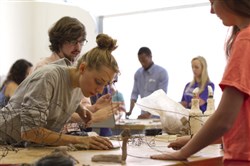VOL. 38 | NO. 34 | Friday, August 22, 2014
Lipscomb expands offerings to fill workplace needs
By Sam Stockard

Lipscomb’s art department is among those that will become part of its new College of Entertainment and the Arts. That college is expected to be fully established in the coming months.
-- Photo Courtesy Of Lipscomb University / Kristi JonesLipscomb University is gearing toward the future this fall with three new programs designed to give students an advantage in a rapidly changing job market.
With a recent vote aimed directly at employment trends, the university’s board of trustees approved a School of Public Policy and Civic Leadership, a separate competency-based program and a physician assistant degree.
“At Lipscomb University, we analyze workforce needs and develop programs that will help meet those needs,” Lipscomb President L. Randolph Lowry says.
“That helps not only our community by filling those essential needs, but also helps our students pursue careers that are highly sought-after when they enter the job market.”
Lipscomb is constantly looking at innovative ways to bolster students’ career efforts, he notes.
Lipscomb set an enrollment record at 4,593 in fall 2013, and university officials expect student numbers to be typical of recent years. Tuition and fees will total $28,000, a 6 percent increase compared to last fall.
The first day of class was Aug. 18, but many graduate programs start on staggered times later in the fall. Lipscomb also offers ways for adult students to earn credits for workplace knowledge to complete degrees.
Student body President Drew Watson says he’s excited to see the administration’s plans for programs and schools fit with the university’s continuing growth.
“I feel this proves the administration is actively seeking ways to reach more students and better serve them,” Watson explains.
“These have proven to be an interest by our current students, and it’s neat to watch the administration respond to the wants and demands of our culture and student body.”
Watson says Lipscomb is becoming a “more forward-looking university,” adding Lowry has always emphasized university’s future.
“Lipscomb’s focus has always begun with the spiritual development of the student, and I believe that our administration has successfully kept that a priority while constantly improving the value of our degree,” Watson says.
A master’s degree in public policy with emphasis in areas of conflict management, health care, education, environmental and public health policies will be available through the School of Public Policy and Civic Leadership.
It will be the nation’s only accelerated master’s degree in public policy based on “an experiential approach” to learning how to apply conflict management and collaborative problem-solving skills, according to Provost W. Craig Bledsoe.
“Our goal is to graduate outstanding public servants with hands-on leadership and management skills that can bring transformative work to the public sector, which is, unfortunately, at the national level these days, all too often seen as dysfunctional,” Bledsoe says.
The university also hopes the school will help generate innovative policies and ideas through conversation, debates, conferences and other student and community activities.
With two years of extensive testing, the competency-based education program will enable Lipscomb to set up degree programs depending on needs in the corporate world and workforce.
Offered through the university’s CORE Competency Assessment and Development Center, it is connected to a model used by the likes of Nike, Wendy’s International Inc. and AT&T, in which students can earn up to 30 credits by going through a rigorous behavioral assessment. It also saves them thousands of dollars in tuition.
About 100 people have gone through the assessments conducted by Lipscomb faculty members, most of them holding doctorates. The program is the first in the nation to be accredited by the Southern Association of Colleges and Schools.
The board of trustees also approved formation of the College of Entertainment and the Arts and the College of Computing and Information Technology, combining some of the university’s strong points under one roof.
Classical arts, music and theatre studies, with its film program, will merge and expand to help students focus on careers in digital entertainment, film, design, gaming and animation.
Computing, informatics and information security programs, which have doubled in size during the last three years, will be combined into one and enjoy more work with business and other programs, according to the university.